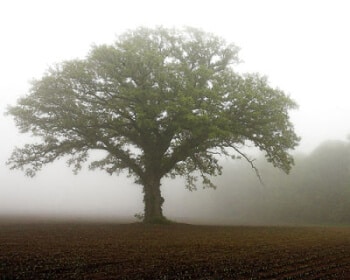
All of us have a need to be part of something big. We want to belong to the greatest country in the world or the largest church in the community. Even ball teams want to call themselves a “nation” now to give supporters the feeling that they belong to something that goes far beyond the reaches of their school.
So when Jesus went forth and announced the Kingdom of God, people got excited. Imagine God establishing a nation on this earth! It would be greater and stronger than any country that ever existed. His kingdom would be far-reaching and powerful, unlike any nation that had ever existed on the earth. They were excited to think that soon they would be citizens of this kingdom.
Keeping this in mind, people must have been confused when Jesus began to describe what the Kingdom of God would be like. Instead of talking about territories, kings, riches, and armies, he talked about trees and bread.
What? The kingdom of God is like a big bush or the kingdom of God is like a loaf of bread! Who wants to be part of bush or a loaf of bread? Their expectations must have deflated when they heard what Jesus said (Luke 13:18-21).
“What is the Kingdom of God like? To what can I compare it? It is like a mustard seed that a man took and planted in the garden. When it was fully grown, it became a large bush and the birds of the sky dwelt in its branches.”
There is nothing smaller and less significant than a tiny mustard seed. And when it grows up it doesn’t even reach the status of a tree—it is just a “large bush.” Birds, however, are excited about this “kingdom-bush.” It gives them a safe and comfortable place to live.
“To what shall I compare the Kingdom of God? It is like yeast that a woman took and mixed with three measures of wheat flour until the whole batch of dough was leavened.”
Yeast? Yuck! Yeasts are fungi, and besides that they smell bad. Yet, without them, bread would forever remain flat. Then at the end when people enjoy the baked bread, the flour may get some credit, but the yeast doesn’t even exist anymore. The Kingdom of God is not even a freshly baked loaf of bread; it is the fungi that allows the flour to explode into something tasteful and enriching.
Do you think the disciples of Jesus felt let down when Jesus described the Kingdom this way? They must have wondered why they left everything to follow Jesus, if they were going to end up looking like mustard seeds or fungi.
Melanie Rigney in reflecting on this reading noted that, “Yeasts begin small processes that spawn big results” (Living with Christ, today’s reading). Seeds and yeasts are powerful—they are alive! Scientists and engineers have the power to build a hundred-story skyscraper, but will never be able to create a tree from scratch or make a dead loaf of flour rise.
Another thing about seeds and leaven. Both must suffer and die before they yield their results. Paul reminded Christians of this kind of suffering in their lives (Romans 8:18-25):
“I consider the suffering of this present time as nothing compared with the glory to be revealed for us…We know that all creation is groaning in labor pains even until now; and not only that, but we ourselves who have the first fruits of the Spirit, we also groan within ourselves as we wait for adoption, the redemption of our bodies.”
Do we realize that part of our suffering is the death process that allows seeds and leaven to “spawn big results?”
For me, one of the encouraging lessons of this teaching, is that when God uses me to plant small seeds of his love and tiny measures of “Holy Spirit” leaven, He is beginning a new process that, someday, will be magnificent. For the most part we will not see these results, and our hidden role is seldom either known nor acknowledged. One thing we do know, however, is that as we go about doing these small things for Christ, we are preparing ourselves for the “glory to be revealed to us.” And there is nothing small or insignificant about this glory!
“Those that sow in tears shall reap rejoicing” (Ps 126:4).
